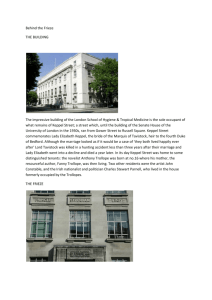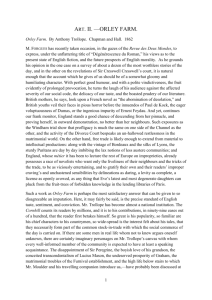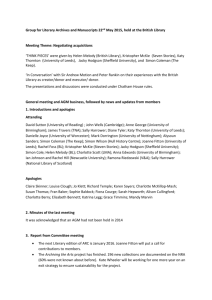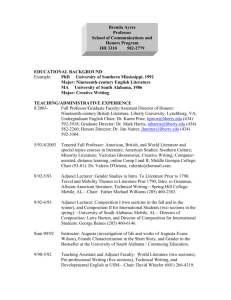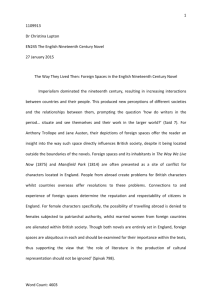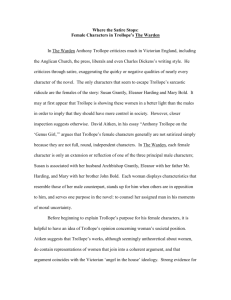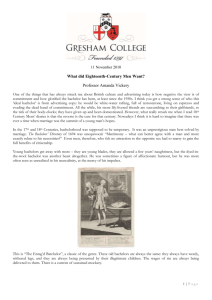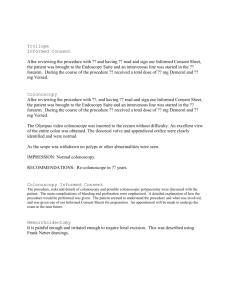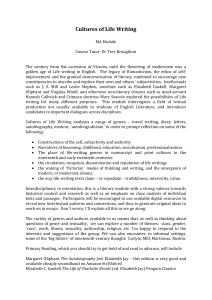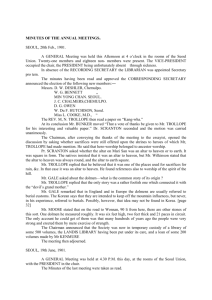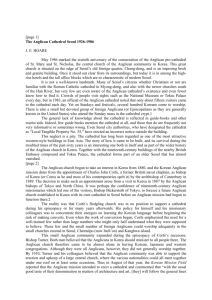Word version
advertisement
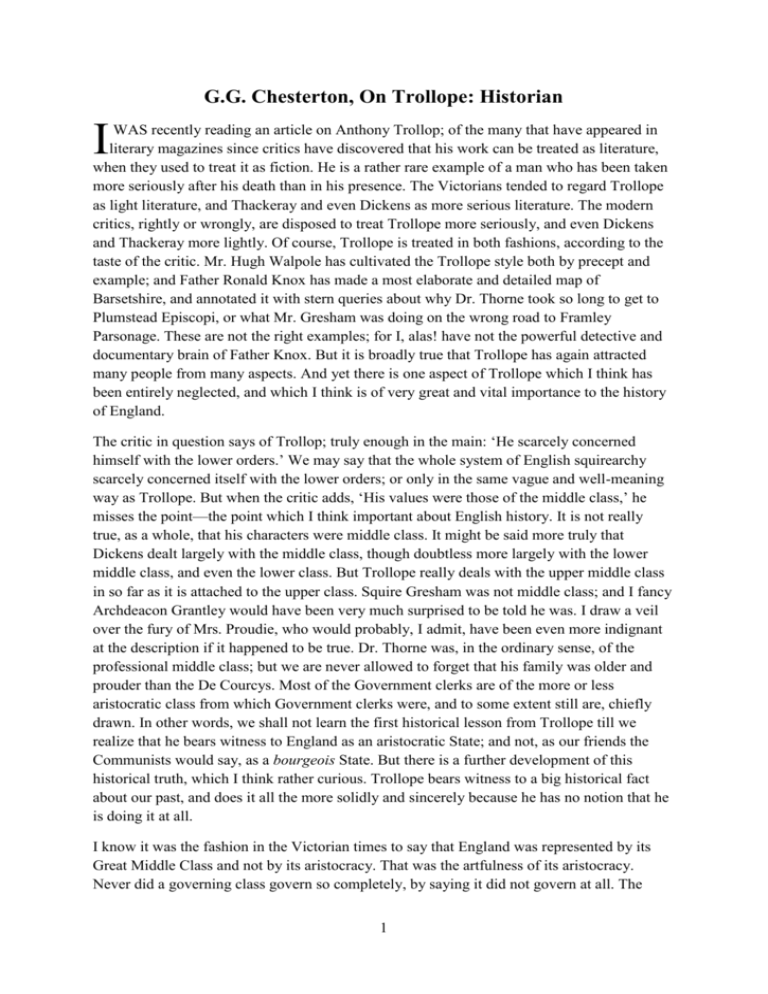
G.G. Chesterton, On Trollope: Historian I WAS recently reading an article on Anthony Trollop; of the many that have appeared in literary magazines since critics have discovered that his work can be treated as literature, when they used to treat it as fiction. He is a rather rare example of a man who has been taken more seriously after his death than in his presence. The Victorians tended to regard Trollope as light literature, and Thackeray and even Dickens as more serious literature. The modern critics, rightly or wrongly, are disposed to treat Trollope more seriously, and even Dickens and Thackeray more lightly. Of course, Trollope is treated in both fashions, according to the taste of the critic. Mr. Hugh Walpole has cultivated the Trollope style both by precept and example; and Father Ronald Knox has made a most elaborate and detailed map of Barsetshire, and annotated it with stern queries about why Dr. Thorne took so long to get to Plumstead Episcopi, or what Mr. Gresham was doing on the wrong road to Framley Parsonage. These are not the right examples; for I, alas! have not the powerful detective and documentary brain of Father Knox. But it is broadly true that Trollope has again attracted many people from many aspects. And yet there is one aspect of Trollope which I think has been entirely neglected, and which I think is of very great and vital importance to the history of England. The critic in question says of Trollop; truly enough in the main: ‘He scarcely concerned himself with the lower orders.’ We may say that the whole system of English squirearchy scarcely concerned itself with the lower orders; or only in the same vague and well-meaning way as Trollope. But when the critic adds, ‘His values were those of the middle class,’ he misses the point—the point which I think important about English history. It is not really true, as a whole, that his characters were middle class. It might be said more truly that Dickens dealt largely with the middle class, though doubtless more largely with the lower middle class, and even the lower class. But Trollope really deals with the upper middle class in so far as it is attached to the upper class. Squire Gresham was not middle class; and I fancy Archdeacon Grantley would have been very much surprised to be told he was. I draw a veil over the fury of Mrs. Proudie, who would probably, I admit, have been even more indignant at the description if it happened to be true. Dr. Thorne was, in the ordinary sense, of the professional middle class; but we are never allowed to forget that his family was older and prouder than the De Courcys. Most of the Government clerks are of the more or less aristocratic class from which Government clerks were, and to some extent still are, chiefly drawn. In other words, we shall not learn the first historical lesson from Trollope till we realize that he bears witness to England as an aristocratic State; and not, as our friends the Communists would say, as a bourgeois State. But there is a further development of this historical truth, which I think rather curious. Trollope bears witness to a big historical fact about our past, and does it all the more solidly and sincerely because he has no notion that he is doing it at all. I know it was the fashion in the Victorian times to say that England was represented by its Great Middle Class and not by its aristocracy. That was the artfulness of its aristocracy. Never did a governing class govern so completely, by saying it did not govern at all. The 1 middle-class Englishman was always pushed into the foreground; while the rulers remained in the background. It was the middle-class Englishman who wrote letters to The Times; it was not he who informed The Times. It was the middle-class man who went to the political meeting; it was not he who sent down the candidate. The governing class governed by the perfectly simple principle of keeping all the important things to themselves; and giving the papers and the public un-important things to discuss. When Earl Balfour (one of the last great survivals of the governing class) said languidly that he never read the newspapers, everybody laughed, as if he had said that he could not read the alphabet. In fact, of course, he never read the newspapers because he had read the State papers. Why should he read all the nonsense that was served out to the public, when he knew all the real secrets which were kept as secrets of State? But when we have realized that the England of Trollope was still an aristocratic England, there is a further distinction, which Trollope never notices, but always makes clear. His evidence is alone enough to upset Macaulay and Green and the whole Whig theory of our history taught in the schools. The really interesting fact to be inferred from Trollope is this. Nineteenth-century England is not a country in which we have a populace led by a Liberal middle class on one side and a powerful Tory nobility led by dukes and earls on the other. The division of the parties is totally different, and unconsciously betrays the real secret, not only of the nineteenth, but of the eighteenth and seventeenth centuries. It betrays the truth about the Glorious Revolution of 1688, and the nature of the new system which it really introduced. The Crown did not pass from James II to William III. Like many stolen treasures, it was cut up; it was cut up into coronets. Let anybody, reading Trollope carefully, note what the real division between the parties was. There is a large proportion of minor gentry, who may be called middle class, if we will, who are certainly numerous and not very rich: doctors, parsons, small squires, and yeomen and all sorts of plain and hard-working people. Now these people are all Tories. They inherit the old Tory tradition of loyalty to a king, which belonged to purely middle-class people like Dr. Johnson or Dr. Goldsmith. Far above all these people, like gods on Olympus, like higher beings living on a loftier plane, there are two or three people who are of prodigious public importance, like emperors or kings. The tone of everybody else in talking about them implies the remote condescension of a sovereign. The obvious example is the Duke of Omnium. He is spoken of as playing a great princely part like a prince. We need not deny him the credit, but we need not disguise the fact that his importance rested on being what we call a millionaire. More presentable, I admit, than the millionaires who are flattered today. But he is ruler of all England because he is gigantically rich. Now this kind of man is always a Whig. What the serious historians have disguised, the frivolous novelist has detected. Their histories are fiction and his fiction is history. That is the truth; and that is Trollope’s unconscious witness to what the Whigs really did in English history; why they were able to overthrow the Stuarts; why they were able to dominate the common traditional Tories like Dr. Thorne. What the Revolution did was obviously not to establish a democracy; not even to establish a normal and national gentry; not even to establish a mere rustic squirearchy. It was to establish certain great magnates, whose wealth and power was far out of proportion to that of the ordinary 2 gentleman, let alone the ordinary citizen. They owned everything, and Trollope knew it. What other possible meaning is there in the title of The Duke of Omnium? Thackeray- also knew it. What possible other meaning is there in that fine satiric flourish, ‘I am not a Whig . . . but oh, how I should like to be!’? Even the waiters and couriers on the Continent knew it. What other meaning was in the Arabian Nights legend of the English Milord? Everybody seems to have known it, except the people who taught history in the schools and universities of England. (All is Grist, 1922) 3
